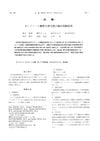 October 2007 in “Journal of Investigative Dermatology”
October 2007 in “Journal of Investigative Dermatology” The meeting highlighted the genetic basis of female pattern hair loss and various skin health insights.
 January 1989 in “Skin research”
January 1989 in “Skin research” The hair regrowth tonic effectively increased hair count and was safe for treating male pattern baldness.
 April 1955 in “Archives of pediatrics & adolescent medicine”
April 1955 in “Archives of pediatrics & adolescent medicine” Children's skin diseases need special care and treatment.
 April 2020 in “Dermatology and therapy”
April 2020 in “Dermatology and therapy” New 5% minoxidil solution improves scalp hydration, reduces redness, and may be safer for sensitive users.
 December 2018 in “Journal of harmonizrd research in applied science”
December 2018 in “Journal of harmonizrd research in applied science” Yoga and Ayurveda, including stress management and herbal oil use, can potentially reduce hair loss and promote hair growth, with further research needed for therapy protocols.

The system can automatically identify different hair and scalp conditions using machine learning.
 4 citations,
May 2020 in “Annals of palliative medicine”
4 citations,
May 2020 in “Annals of palliative medicine” Plum blossom needle acupuncture with qi-invigorating therapy is more effective for Seborrheic Alopecia than Western medicine.
4 citations,
October 2017 in “Indian drugs” Hibiscus rosa-sinensis L. leaves and flowers contain various compounds with potential medicinal uses.
 December 2024 in “Majalah kedokteran Bandung/Majalah Kedokteran Bandung”
December 2024 in “Majalah kedokteran Bandung/Majalah Kedokteran Bandung” Carrot seed oil thickens hair roots and tips, with 75% concentration being most effective.
 December 2024 in “Plant Science Today”
December 2024 in “Plant Science Today” Phyla nodiflora contains compounds that may help treat diabetes, alopecia, cancer, and anti-diuresis.
 January 2024 in “Dermatologic Therapy”
January 2024 in “Dermatologic Therapy” PRP therapy with specific growth factors improves hair density and thickness in androgenic alopecia.
Hibiscus leaf extract in hair tonic promotes hair growth effectively.
30 citations,
June 2013 in “Optometry and vision science” Following a specific clinical sequence can help diagnose and treat Demodex mites in the eyes.
 10 citations,
April 2015 in “PubMed”
10 citations,
April 2015 in “PubMed” Rosemary oil and minoxidil 2% both effectively increase hair count in people with androgenetic alopecia, but rosemary oil causes less scalp itching.
 8 citations,
August 2021 in “Computational and Mathematical Methods in Medicine”
8 citations,
August 2021 in “Computational and Mathematical Methods in Medicine” Machine learning can accurately identify Alopecia Areata, aiding in early detection and treatment of this hair loss condition.
 4 citations,
October 2022 in “Journal of Imaging”
4 citations,
October 2022 in “Journal of Imaging” An intelligent system can classify hair follicles and measure hair loss severity with reasonable accuracy.
4 citations,
February 2018 in “World journal of surgical oncology” A young woman with kidney cancer experienced rare hair loss from a cancer drug and unusual cancer spread, suggesting early drug treatment might reduce spread and prolong survival.
 3 citations,
September 2022 in “Molecules”
3 citations,
September 2022 in “Molecules” Camellia seed cake extract may help hair growth by blocking the hair loss effects of a hormone called DHT.
 3 citations,
October 2020 in “Dermatology Reports”
3 citations,
October 2020 in “Dermatology Reports” Many women in North West Saudi Arabia use herbal and home remedies for hair care, often learning about them through family and media.
2 citations,
February 2013 in “Journal of the Saudi Society for Dermatology & Dermatologic Surgery” New hair spray caused a hair shaft disorder.
 1 citations,
June 2023 in “Cureus”
1 citations,
June 2023 in “Cureus” Many women with seborrheic dermatitis also have acne and diabetes, and should be checked for these conditions to help improve their quality of life.
1 citations,
October 2022 in “Evidence-based Complementary and Alternative Medicine” Traditional Chinese Medicine may help treat hair loss but needs more research.
 1 citations,
January 2017 in “Journal of Clinical and Diagnostic Research”
1 citations,
January 2017 in “Journal of Clinical and Diagnostic Research” Sodium valproate can cause reversible hair loss in some patients.

The document's conclusion cannot be provided because the content is not accessible or understandable.
Low-temperature extracts of black beans, peony, and green tea improve scalp health and are better than traditional hot-water extracts.
 September 2024 in “Brazilian Journal of Hair Health”
September 2024 in “Brazilian Journal of Hair Health” Nutrients can help improve hair growth and thickness caused by pollution.
August 2024 in “Journal of Drug Delivery Science and Technology” The new minoxidil formulation could better promote hair growth for treating androgenic alopecia.
 June 2024 in “Infection and Drug Resistance”
June 2024 in “Infection and Drug Resistance” An adult woman with scalp infection recovered after antifungal treatment, with no return of symptoms.
 April 2024 in “Animal models and experimental medicine”
April 2024 in “Animal models and experimental medicine” PRP treatment helps hair growth and rebalances scalp bacteria in androgenetic alopecia patients.





















